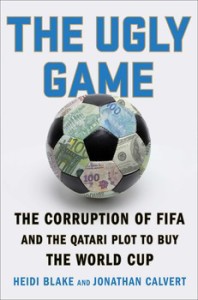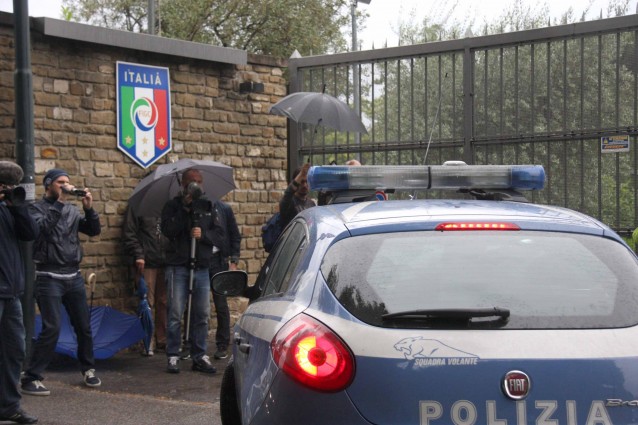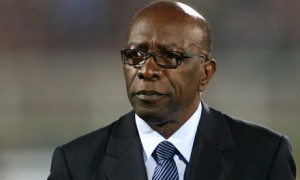Two weeks before the FIFA election to select Sepp Blatter’s successor as president, the Football Scholars Forum, an international group based at Michigan State University, discussed The Ugly Game: The Corruption of FIFA and the Qatari Plot to Buy the World Cup by Heidi Blake and Jonathan Calvert.
Qatar’s successful 2022 World Cup bid and the role of the now-disgraced ex-FIFA ExCo member Mohamed Bin Hammam came under close scrutiny. The authors’ reliance on leaked FIFA electronic files called attention to the challenges and opportunities for scholars working with “big data.” There was discussion about discourses of Western bias and even racism against Africans and Asians (especially Arabs) that are sometimes perceived to be embedded in corruption allegations. Another topic tackled during the event was the intriguing question of whether there should be a universal standard of human rights required for nations to host the World Cup.
The session closed with important contributions related to the upcoming FIFA presidential ballot. Will Sheikh Salman or Gianni Infantino win? And what kinds of reforms might the new leadership deliver? What is the likelihood that any changes introduced will meaningfully transform the structure and governance of the much-maligned world body? In a climate plagued by corruption and cynicism, is there any hope for a better future?
An audio recording of the session is available here.
For more information about the Football Scholars Forum, visit footballscholars.org.
Tag: corruption
 The FIFA special presidential election will take place on February 26 in Zurich, Switzerland. On Thursday, February 11, at 2pm Eastern U.S. time. the Football Scholars Forum will intellectually and spiritually prepare for this momentous event with an online discussion of The Ugly Game: The Corruption of FIFA and the Qatari Plot to Buy the World Cup by British reporters Heidi Blake and Jonathan Calvert.
The FIFA special presidential election will take place on February 26 in Zurich, Switzerland. On Thursday, February 11, at 2pm Eastern U.S. time. the Football Scholars Forum will intellectually and spiritually prepare for this momentous event with an online discussion of The Ugly Game: The Corruption of FIFA and the Qatari Plot to Buy the World Cup by British reporters Heidi Blake and Jonathan Calvert.
The investigative reporting of Blake and Calvert drew extensively on a huge volume of leaked FIFA files they received from a whistleblower within the organization. The book explores the Machiavellian ways in which Qatar won the right to host the 2022 World Cup. The story centers around the actions of now-disgraced FIFA Executive Committee member Mohamed Bin Hammam. The evidence and allegations in the book are striking. In unveiling cash-for-votes schemes and more, the book raises profoundly troubling questions about football governance and the likelihood of the February 26 election yielding meaningful institutional reforms in a post-Blatter FIFA.
For more information about the Football Scholars Forum and to join the February 11 online conversation, email Alex Galarza (galarza DOT alex AT gmail).
 Alexandra Wrage, a Canadian attorney and founder of TRACE International, a business anti-corruption group, was interviewed by BBC Newsnight about the ongoing FIFA corruption scandal over Qatar’s successful bid to host the 2022 World Cup.
Alexandra Wrage, a Canadian attorney and founder of TRACE International, a business anti-corruption group, was interviewed by BBC Newsnight about the ongoing FIFA corruption scandal over Qatar’s successful bid to host the 2022 World Cup.
Wrage worked for FIFA’s governance reform commission from 2011 to 2013. In April 2013 she told the Wall Street Journal “that the FIFA executive committee ‘undermined the recommendations we were making’at almost every turn.” She resigned because “you don’t keep doing the same thing if you’re not having an impact.”
Wrage believes change is more likely to come if Swiss law regulates locally based non-profits like FIFA (sic!) more effectively and, perhaps, if a groundswell of popular criticism can compel corporate sponsors to take action.
Click here to watch the 4-minute interview.
The Italian Job: Revisited

Police raid the Italian national team camp and an earthquake in Emilia-Romagna forces the cancellation of the Italy-Luxembourg Euro warm-up. It’s been a tough week for Italian tifosi, on and off the pitch.
Defender Domenico Criscito left the Euro squad after being implicated in the latest wave of prosecutorial investigations and charges. Meanwhile, Antonio Di Natale emerged as a pale as a ghost after riding out the 5.9 magnitude quake in an elevator.
The latest developments in calcio’s corruption and match fixing scandal have produced 19 arrests, including that of Lazio captain Stefano Mauri and ex-Genoa man Omar Milanetto. Prosecutors in Bari, Cremona, and Napoli have also implicated several dozen high profile players, managers, and club officials. That this mess is taking place only a few years after “calciopoli” — which famously landed Juve in serie B and penalized Milan, Lazio, and Fiorentina — is a potent indictment of the Italian football system and its willingness or ability to reform itself.
Italian authorities and prosecutors inspire confidence in some circles that the metastasizing problem will finally be addressed (read Declan Hill’s blog post here), but I find this optimistic view problematic on a number of levels. Here’s why:
First, the justice system in Italy is utterly dysfunctional. From civil to criminal cases, almost nothing works properly. The country has more than 10,000 laws on the books, that’s more than most, if not all, other countries in the world. Moreover, culprits of egregious crimes are often let off the hook with little more than a slap on the wrist while minor cases take years to resolve. And that’s just the tip of the iceberg.
Second, calcio works exactly like Italian politics. Family and “big man” cliques dominate and actively seek to expand their narrow interests against the common good. From serie A and B all the way to the lowest amateur ranks, this situation makes it almost impossible to develop a fair, equitable, and sustainable solution to the football rot.
Third, Italian sport and society struggle with a culture of cheating that pivots around what may be labeled “situational ethics” and a common sense rationalization that laws are made to be circumvented.
Given this dispiriting local situation and a worrisome rise in match fixing, corruption, and bribery on a global level, the Italian Prime Minister Mario Monti’s recent statement “that it would really benefit the maturity of us Italian citizens if this game was completely suspended” for a couple of years seems like a good idea. It might create the space needed for a soul-searching dialogue aimed at finding long-term solutions to calcio’s spiral of decline.
FIFA Bribes on Video: The Jack Warner Files

The Daily Telegraph web site posted video evidence of Jack Warner, former CONCACAF president and FIFA vice-president, explaining Mohammad Bin Hammam’s cash-for-votes scheme at a Caribbean Football Union meeting in March 2011. “If you are pious then go and build a church,” he tells the audience.
Short version of the video here, long version here